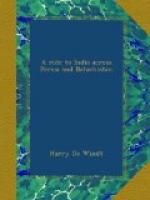Though it was very cold, and the snow lay deep upon the ground, my stay at Teheran was not unpleasant. The keen bracing air, brilliant sunshine, and cloudless blue sky somewhat made amends for the sorry lodging and execrable fare provided by mine host at the Hotel Prevot. I have seldom, in my travels, come across a French inn where, be the materials ever so poor, the landlord is not able to turn out a decent meal. I have fared well and sumptuously at New Caledonia, Saigon, and even Pekin, under the auspices of a French innkeeper; but at Teheran (nearest of any to civilized Europe) was compelled to swallow food that would have disgraced a fifth-rate gargotte in the slums of Paris. Perhaps Monsieur Prevot had become “Persianized”; perhaps the dulcet tones of Madame P., whose voice, incessantly rating her servants, reminded one of unoiled machinery, and commenced at sunrise only to be silenced (by exhaustion) at sunset, disturbed him at his culinary labours. The fact remains that the cuisine was, to any but a starving man, uneatable, the bedroom which madame was kind enough to assign to me, pitch dark and stuffy as a dog-kennel.
A long conference with General S—, an Austrian in the Persian service, decided my future movements. The general, one of the highest geographical authorities on Persia, strongly dissuaded my attempting to reach India via Meshed and Afghanistan. “You will only be stopped and sent back,” said he; “what is the use of losing time?” I resolved, therefore, after mature deliberation, to proceed direct to Ispahan, Shiraz, and Bushire, and from thence by steamer to Sonmiani, on the coast of Baluchistan. From the latter port I was to strike due north to Kelat and Quetta, and “that,” added the general, “will bring you across eighty or a hundred miles of totally unexplored country. You will have had quite enough of it when you get to Kelat—if you ever do get there,” he added encouragingly.
The route now finally decided upon, preparations were made for a start as soon as possible. Portmanteaus were exchanged for a pair of light leather saddle-bags, artistically embellished with squares of bright Persian carpet let in at the side, and purchased in the bazaar for twenty-two kerans, or about seventeen shillings English money. In these I was able to carry, with ease, a couple of tweed suits, half a dozen flannel shirts, three pairs of boots, and toilet necessaries, to say nothing of a box of cigars and a small medicine-chest. Gerome also carried a pair of bags, containing, in addition to his modest wardrobe, our stores for the voyage—biscuits, Valentine’s meat juice, sardines, tea, and a bottle of brandy; for, with the exception of eggs and Persian bread, one can reckon upon nothing eatable at the Chapar khanehs. There is an excellent European store shop at Teheran, and had it not been for limited space, we might have regaled on turtle soup, aspic jellies, quails, and pate de foie gras galore throughout Persia.




